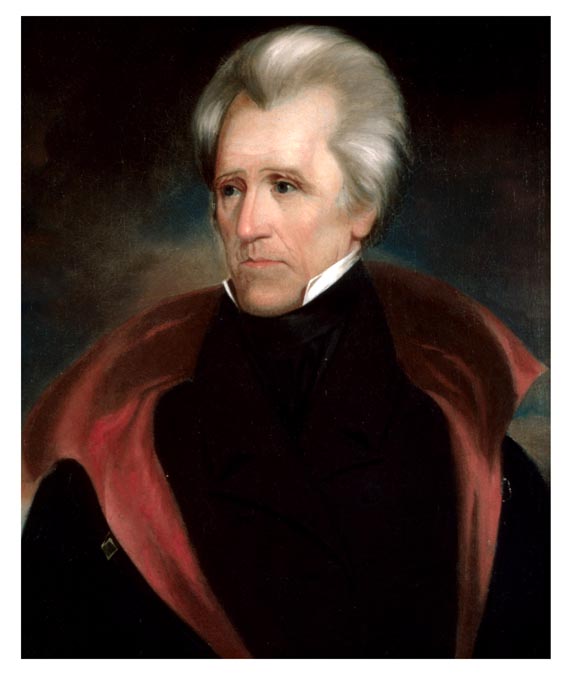
“I was born for a storm. And a calm does not suit me.” —Andrew Jackson
Andrew Jackson was born in the colonial Carolinas March 15, 1767 and was an American lawyer, general, and statesman, who served as the seventh president of the United States, 1829 to 1837.

Jackson had gained fame as a general in the United States Army and served in both houses of the U.S. Congress. He was an expansionist president and sought to advance the rights of the common man and to preserve the Union at the same time that he became a wealthy, slave-owning, planter. He had served as the first territorial governor of Florida.
Jackson served as a justice on the Tennessee Supreme Court, 1798-1804. He purchased a property later known as The Hermitage. He was appointed colonel of the Tennessee militia and was elected its commander the following year. He led troops during the Creek War of 1813-1814 to win the Battle of Horseshoe Bend. The subsequent Treaty of Fort Jackson required the Creek surrender of vast lands in Alabama and Georgia.
He began the process of forced relocation and removal of Native Americans from U.S. territory east of the Mississippi River that became known as the ‘Trail of Tears.”
Jackson was the most contradictory of men. A champion of extending freedom and democracy to even the poorest of whites, Jackson was an unrepentant slaveholder. A sentimental man who rescued an Indian orphan on a battlefield to raise in his home, Jackson was responsible for the removal of Indian tribes from their ancestral lands. One biographer has suggested that “Jackson achieved great things while committing grievous sins.”
Jackson was the only American president to take a bullet in a frontier gunfight and the only one who tried to assault his own would-be assassin. An uneducated boy from the Carolina backwoods, the son of Scot-Irish immigrants, he became a fabled figure after his victory over the British at New Orleans in 1815.
His presidency began March 4, 1829. During the 1828 presidential campaign, Jackson founded the political force that coalesced into the Democratic Party. As president, he instituted the spoils system for federal government positions and used his patronage powers to build a powerful and united Democratic Party.
Jackson engaged in a long struggle with the Second Bank of the United States which he viewed as an anti-democratic bastion of elitism. He emerged triumphant on the “Bank War” and the federal charter for the Second Bank of the United Stated expired in 1836. He sought numerous commercial treaties with foreign powers and recognized the independence of the republic of Texas.
Jackson was the most influential and controversial political figure of the 1830s and his two terms as president set the tone for the era of American public discourse known as the Jacksonian Era.
He was wed with Rachel Donelson in 1794 who died suddenly during Christmas 1828 of an apparent heart attack. They were a devoted couple and historians have written that Jackson never got over her loss. She loved him unconditionally. During the War of 1812 she wrote “Do not, My beloved Husband, let the love of Country, fame, and honor make you forget you have me. Without you I would think them all empty shadows.”

